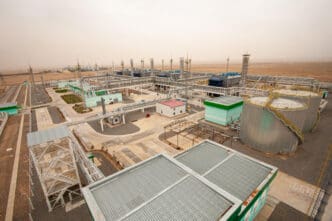President Donald Trump’s comprehensive global tariffs have sparked significant concern regarding a potential severe economic downturn. Simultaneously, there is curiosity about how these tariffs might influence the global climate. A slowdown in international trade could temporarily reduce greenhouse gas emissions, as emissions partly arise from fossil fuels used to transport goods worldwide via ships, planes, and vehicles. However, the rising costs associated with tariffs are expected to impede efforts to transition to green energy sources, ultimately overshadowing any short-term emissions reductions.
Experts suggest that while a decrease in economic activity could initially lower emissions, the long-term impact on climate change remains negative. The tariffs are likely to affect clean technology industries more than others, primarily because of trade relationships with China, a major supplier of renewable energy equipment. Any reduction in emissions due to decreased trade activity would be short-lived, with emissions expected to rebound quickly. Significant structural changes, such as replacing fossil fuels with renewable energy, are necessary for meaningful progress in addressing climate issues.
The current U.S.-China trade tensions present a unique challenge compared to historical economic slowdowns, as China produces a large portion of the equipment needed for renewable energy, including solar panels. Trump has imposed, then temporarily suspended, import taxes on numerous countries and significantly raised tariffs on Chinese products, which could slow global trade and economic growth. During previous economic crises, such as the COVID-19 pandemic and the global financial crisis, carbon emissions initially dropped but rebounded soon after. Experts predict only a slight reduction in emissions if full tariffs are enacted, a decrease far less significant than what was observed during the pandemic.
Higher costs of components for renewable energy projects, resulting from tariffs, could render some projects economically unfeasible and reduce the import of electric vehicles, thereby increasing emissions. The transition to electric vehicles is crucial in reducing road transport emissions, and the United States depends significantly on imports from China for these vehicles.
Investors in renewable energy, such as Excelsior Energy Capital, express concerns that tariff-induced volatility could necessitate a recalibration of investment strategies, potentially slowing progress in the energy transition sector. Price increases on imports, including grid-scale batteries and solar panels, further complicate efforts to shift towards sustainable energy solutions. As a result, there might be an increased reliance on fossil fuels, thus perpetuating carbon emissions for years to come.
Our Perspective
The imposition of global tariffs under President Trump introduces complexities that may affect daily life and long-term climate goals. Consumers could experience increased costs for goods, particularly those linked to renewable energy technologies. This price surge could slow the adoption of electric vehicles and other green technologies, delaying the transition away from fossil fuels. Communities and industries striving for sustainability may find it challenging to maintain momentum in their efforts towards cleaner energy solutions.
The potential economic downturn and trade disruptions could impact job markets, particularly in sectors reliant on international trade and renewable energy. As industries adjust to changing economic conditions, job stability and opportunities may fluctuate, affecting household incomes and financial security. Local businesses involved in clean energy projects may face uncertainty, which could affect their growth and contribution to regional sustainability initiatives.
Ultimately, while the short-term economic implications of tariffs might offer slight reductions in emissions, the long-term consequences could hinder progress toward a more sustainable future. Strategic planning and collaboration between policymakers, industries, and communities are essential to navigate these challenges and ensure a balanced approach to economic and environmental objectives.








